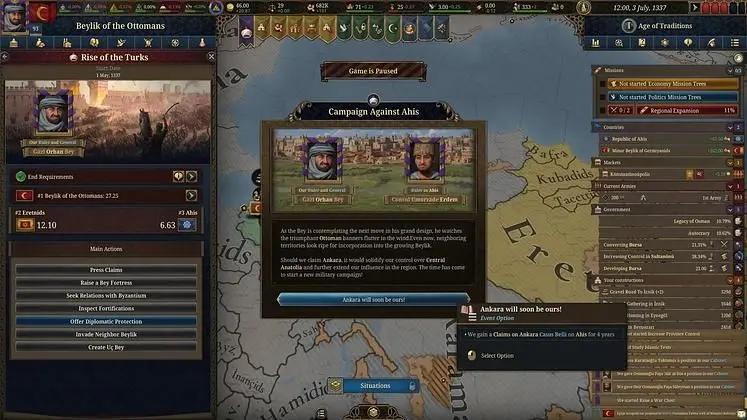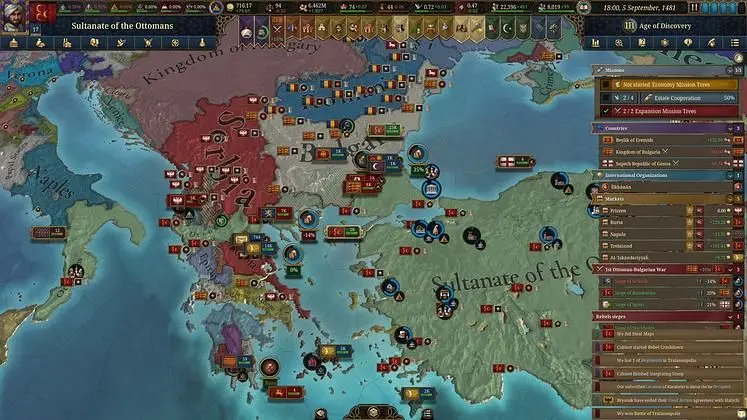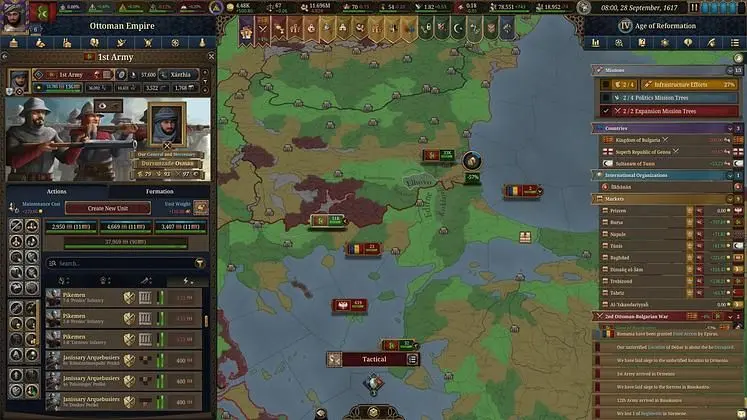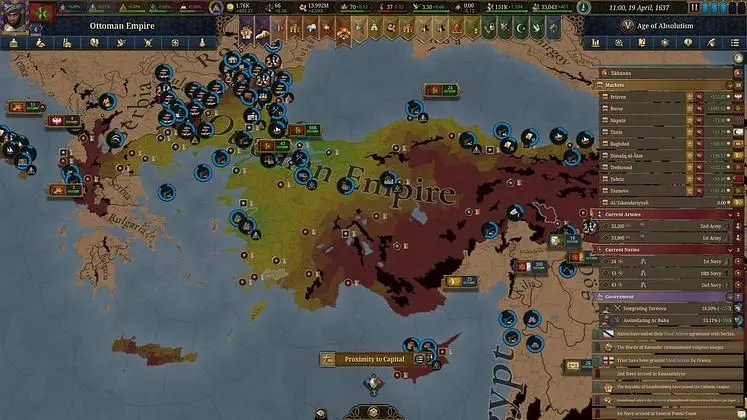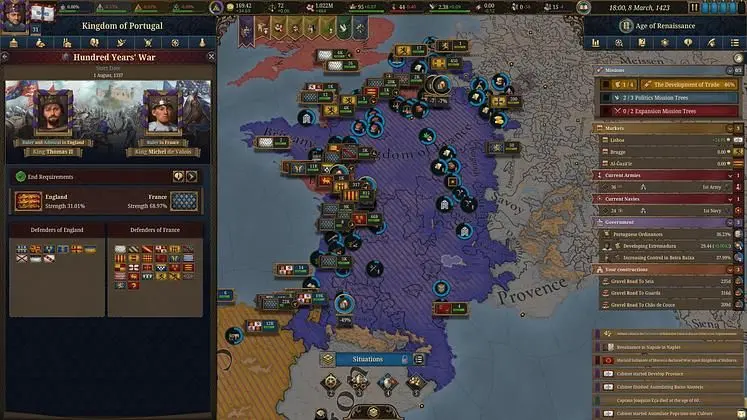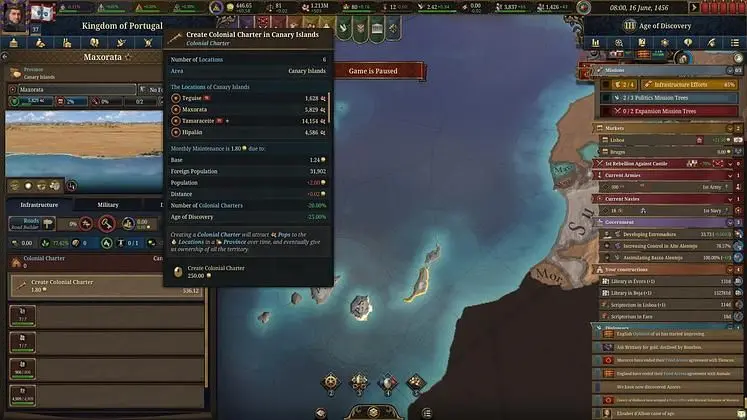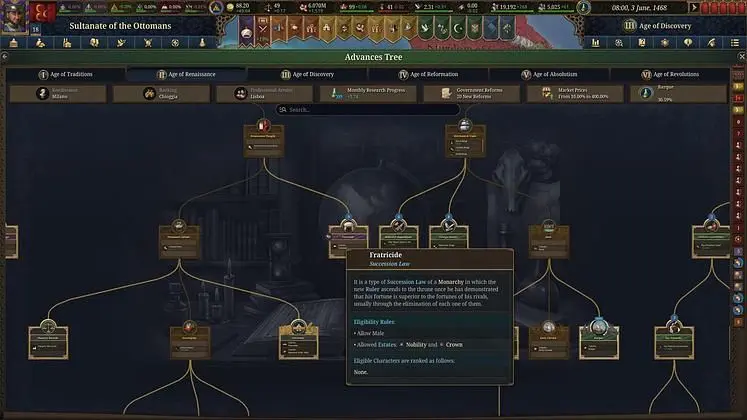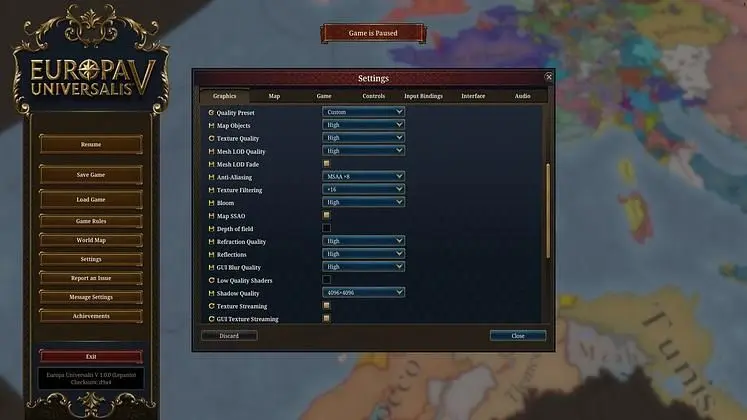As soon as you reach its map screen, Europa Universalis 5 already tests your willingness to commit to its intricate reimagining of a series known for being a tough nut to crack. From its sheer scope to the eldritch horror of the Holy Roman Empire – depicted as an insanely granular, chaotic grouping of tens of small countries – and a slick UI hiding menus within menus, I wouldn’t fault newcomers or even semi-casual Paradox grand strategy fans for taking a good while to get their bearings before unpausing.
Yet, pushing through this overwhelming first impression and taking the time to carefully explore the UI gradually unveils a smart reinvention of this Paradox staple. Informed by elements of the publisher’s other grand strategy games, EU5 sheds its predecessor’s boardgame trappings. In their place, it infuses a hefty amount of detailed simulation, while offering enough tools to claim a modicum of success even when relying on approximate knowledge as you’re wrestling with its complexity.
Europa Universalis 5 covers the Late Middle Ages – starting as early as 1337, with the Black Death joyfully claiming the lives of millions of now-simulated pops – up to the Early Modern Period, ending at 1836. This journey from rat to railway puts you in charge of a country’s key aspects, including administrative and economic duties, resource production, trading, and warfare.
You can, of course, pick the major European powers and their smaller counterparts, but just as well opt to help the Ottomans – or any neighboring Beylik – rise to power while fighting for control of Anatolia. You can ride with the Golden Horde, expand the Sultanate of Delhi, manage Japan’s Ashikaga Shogunate, but also lead tribes in Indonesia, Africa, or the Americas. Some have more flavor than others, but choice is clearly not something Europa Universalis 5 lacks at launch.
For all its reshaped elements, EU5 preserves the series’ DNA by remaining, at its core, a grand strategy game where modifier stacking makes your country more efficient while it gets closer to its goals. New and familiar processes now rely on detailed simulation, meaning that your efforts are no longer funneled through gathering three abstract currencies and repeatedly clicking their associated buttons.
To develop your provinces, assimilate foreign cultures, or increase your country’s stability, you have to assign a limited number of cabinet members – which you handpick based on their stats – to perform each task. To upgrade your armies, you need to navigate technology trees, which you can only access once the institutions that gate these advancements naturally spread to your lands from their points of origin.
Need lumber to construct roads or buildings to produce other goods? You not only have to expand your resource gathering operations, but also ensure that your population either migrates to specific areas or promotes swiftly enough to more elevated categories – like laborers or burghers – so that your new workplaces don’t remain empty as the months pass by.
But before delving further into Europa Universalis V’s systems, I do have to stop and talk about automation – an incredibly useful tool for newcomers, even if one that doesn’t fully solve the Paradox grand strategy tutorial puzzle.
Through its dedicated menu – or handy cogwheels strategically placed around the UI – you can opt to automate entire sections of the game (or just parts of them), delegating aspects like trading, construction, closing or subsidizing buildings, taxes, recruitment, and more to the AI.
The flexibility of freely turning automation on and off works wonders in terms of allowing you to learn the game a few chunks at a time. It also staves off cognitive overload when you have a parliament vote to keep track of as you’re fighting a war while losing money with people getting increasingly antsy about your inability to procure pepper from faraway lands.
Nested tooltips also return, joined by a fairly robust hint system and missions that, while resembling EU4’s, feel rather underbaked, only really serving as a means of pointing you in the direction of specific subsystems, but little else.
During my first playthrough, I foolishly chose Portugal rather than one of the six recommended countries, firmly believing that finding a boatload of gold on a distant island would remove the need to read large chunks of text in the game’s guided tutorial. I had trouble bringing the negative income the country starts with into the green despite my best efforts to construct structures meant to yield profit.
My alliance with Castile then dragged me into a war with Morocco. My relatively small fleet could only transport half of my army of 13,000 peasants at a time, getting them slaughtered upon crossing the Strait of Gibraltar by the 10,000 Moroccans waiting behind the fog of war. Planning and logistics, it turns out, matter during wartime.
Resorting to the ancient art of save scumming, I decided to follow Castile’s lead instead, making for the city of Ar-Rabat and taking the Moroccans by surprise. Castile broke off to deal with their main force, which was when I learned that sieging fortified positions is often costly.
It can also take quite a while – especially when lacking professional armies and proper siege equipment, so everyone waits for Miguel the farmer to chip away at a stone wall with his pitchfork. In just a few months, the lack of supplies ensured I had 12,000 fewer peasants to work my fields at the end of the war.
Switching to the Ottomans, the guided tutorial and the country’s stronger starting position provided a better environment to get to grips with how Europa Universalis 5 works. I still learned the hard way that topography and weather also matter during wartime, when my Jannisary doomstack ended up stuck in the mountains during winter while attempting to catch two smaller armies.
My vastly inferior opponent ran around my lands unhindered, capturing regions and needlessly prolonging a war that I should have easily won. It stung twice as much since, after previously being declared Military Hegemon of the World, I had to settle with taking just one province and a few ducats during peace talks that I was forced into by several rebellions breaking out at the other end of my empire.
Whereas Portugal has fewer means of obtaining Casus Belli – asking for one in Parliament is costly, while setting up a spy network to create one takes time –, the Ottomans benefit from the Rise of the Turks Situation. This is a dedicated menu that grants easier access to reasons for war against countries in Anatolia and the Balkans in exchange for ducats. It also grants the ability to secure territories through marriage or attempt to obtain gold or recognition from the Byzantine Empire.
Similar Situations appear as the game’s ages progress, covering the Hundred Years’ War, the European conflict between Catholics and Protestants, or the Sengoku Jidai in Japan. These fairly straightforward additions elegantly add regional flavor, but may lose their glimmer in subsequent playthroughs.
Catholic Nations can interact with the Catholic Church, an International Organization that has its own laws, different from your country’s, alongside a handful of exclusive options. Using its special currency allows you to initiate votes on Papal Bulls – which grant additional stat bonuses –, canonize saints, ask for Cardinal Seats, or call for Crusades.
A standard defensive league also falls into this category – although with just one law defining protection clauses that the AI loved spamming calls to vote on no justifiable reason. International Organizations further add historical flavor, but can also feel lackluster to an extent as they don’t evolve much throughout the ages.
Economy is comprised of the taxes you earn from Estates – Europa Universalis V’s representation of key groups in your country, like the nobles or burghers – and trade. In the case of the former, you’ll have to balance keeping them happy while stopping them from overpowering the crown.
A mixture of events that roll through the whole playthrough directly tie into Estate satisfaction. They offer bonuses and maluses, often forcing you to sacrifice long-term goals (like shifting your country’s values towards Plutocracy rather than Aristocracy) to avoid greatly upsetting and prompting these groups to rebel.
When push comes to shove, you can grant privileges that provide powerful effects to the country at the cost of increasing the overall power of that group and potentially lessening the influence of the crown. They’re also quite difficult to revoke, making you weigh the decision quite heavily.
Although Portugal and the Ottomans have quite a bit of dedicated flavor, EU5’s generic events do become repetitive before the end of the first playthrough. Yet, their impactful consequences stopped me from zoning out and just clicking through them.
As other factors impacted three of the main currencies – Stability, Prestige, and Legitimacy –, a chain of unlucky events brought them low enough to trigger a coup attempt. Later, a stroke of luck gave me a much needed infusion of currency and ducats that enabled greatly expanding my naval capabilities.
Provinces are also a major part of the taxation puzzle beyond the goods that they produce and the people they house, but simple ownership of a territory guarantees little. Even after claiming land in the Crescent, a control value of 0 meant I was getting precisely that many ducats tax-wise. Cabinet members can help increase control, but areas far removed from your capital always prove trickier to rein in, reflecting the challenges of larger empires.
Trading, as mentioned before, is the other big part of EU5’s economy, requiring you to manage the influx of various goods, as evolving supply and demand determine the exact price of items. Much like choosing individual production methods, which determine the input goods and the output quantity of buildings, these systems – imported from Victoria 3 yet simplified – continue to elude me, so I relied on automation to handle them, which worked quite well.
Wrestling with the sheer number of trade choices feels especially daunting. Worse yet, increasing the amount of goods imported never seemed to directly help fulfill my people’s needs when doing it manually, with little feedback as to why that was the case. There may be an explanation hidden somewhere or a gap in my understanding, but this area was the only one that made me feel absolutely defeated while attempting to get a basic grasp of how it works.
Conquest in Europa Universalis 5 feels slower, and taking over large chunks of land can bring more trouble than it’s worth, so you’ll have to carefully think about who and when you attack. The inability to direct allied troops, coupled with how exhausting chasing armies in longer, multi-front wars gets also leaves space for improvement.
But once you lay down arms, integrating provinces – a key part of avoiding constant rebellions – also takes quite a bit of time. When integrated, these regions still house pops of a different, potentially discriminated culture or religion, who won’t be too happy knowing you’re the new boss.
So, after bringing a chunk of Serbia and Bulgaria into the Ottoman Empire, I ended up having to deal with revolts from not just Serbian and Bulgarian patriots but also followers of the Orthodox faith. In addition, neighbors tend to both ally each other and form further-reaching coalitions if you expand too aggressively.
Although coalitions were more passive than I would have expected, the Pope did call a Crusade after I pushed into Naples – funnily enough, with the pretext of stopping me from conquering the Balkans. It spanned several years, ending in a relative stalemate thanks to the AI’s misuse of superior forces and my powerful Egyptian allies swooping in to save my hide when my resources were completely spent.
Even without a truce mechanic that makes follow-up wars costly in terms of Stability, all these factors forced me to alternate between a few years of conquest led by lengthier stretches of peace, as I attempted to integrate, convert, and assimilate non-Turkish cultures. You could potentially lean into a multicultural empire by spending Prestige to treat multiple cultures as accepted, but I found that it’s easier to deal with Bulgarian patriots by just telling some guy I knew to turn them all into Turks.
Dipping my toes into colonization as Portugal, I sent expeditions to uncover distant parts of the world. Doing so can be a risky investment. Although you can form colonial charters for unclaimed land in newly discovered areas, other countries will race you to establish colonies of their own. Everyone’s pops seem to make their way there, but the race winner ultimately grabs the land, leading to a loss of invested ducats and Legitimacy for anyone else involved.
Colonies naturally tie into trading, acting as sources of valuable goods you may not have access to back home. There’s also the question of whether or not overseeing them yourself – at the cost of lower control – is wiser than entrusting their management to colonial subjects and reaping a portion of the rewards.
Leaning into colonialism and building up a smaller country while focusing less on war carried a serene sense of satisfaction which grew as my explorers gradually removed the fog of war from the map, then suddenly plummeted when I saw the Papal States beating me to every little island I wanted.
Undoubtedly engrossing, Europa Universalis V’s review build nonetheless had issues. Some buttons would require several clicks to work. Menus also sometimes appeared empty until I opened them a second time.
Although the AI did wage wars, with France sweeping across northern Castille, England chasing the Irish through the woods for two-or-so centuries, the Papal States gobbling up the Byzantine Empire, and Egypt establishing an unshakeable foothold in Nubia, the broader world map – or at least the parts I could see – rarely suffered any seismic shifts, feeling a smidge too static. The most outlandish thing I noticed was Genoa fighting Romania – which Wallachia had formed – several times over land in Crimea.
Performance
On an i7-13700K, 32 GB RAM, and Nvidia RTX 3080@1440p, Europa Universalis V ran reasonably well at high settings, but the review build wasn’t the most stable. When staying at the same map zoom level, it gravitated between 40-65 FPS without DLSS and 50-120 FPS with DLSS set to Quality. The frame rate varied quite greatly depending on how much was happening on screen and how quickly I was moving to new regions of the map.
I saw my fair share of stutters when changing map zoom levels and, more egregiously, when a new month started, particularly when playing on speeds 4 and 5, but not exclusively. Far worse were the 15+ crashes I encountered during my Ottoman playthrough, the likelihood of which increased during longer sessions.
EUROPA UNIVERSALIS V VERDICT
Europa Universalis 5 marks a bold step forward for the series, managing to lets its tangle of initially intimidating systems breathe and interact with each other in an outright impressive manner that also feels less limiting than the Monarch Power of its predecessor. The sheer amount of detail and granularity on display feeds into a complex gameplay loop that, with enough patience and help from its integrated automation, reveals itself as surprisingly approachable while allowing you to claim victories as you’re learning the ropes.
Its focus on simulation does translate to a slower-paced sequel that, on top of demanding lots of time for one playthrough, can also feel cumbersome. Yet, in breaking away from the series’ boardgame roots and borrowing elements from its cousins, Paradox Tinto has managed to truly put the “grand” in grand strategy, creating a beast of a game that’s eager to eat hundreds of your hours provided you’re brave enough to cross the swamp leading to its lair.
TOP GAME MOMENT
Exploiting an earthquake event to conquer Constantinople as the Ottomans.
Good vs Bad
- Well-executed simulation replacing EU4's Monarch Power
- Deeper systems, more meaningful choices
- Situations and International Organizations add historical flavor
- Automation greatly aids learning complex systems
- Plenty of choice in terms of playable countries and playstyles
- Varied soundtrack, including a few regional pieces
- Daunting at first
- Generic events become repetitive
- Slower pace can feel cumbersome at times
- Crashes and wobbly performance
